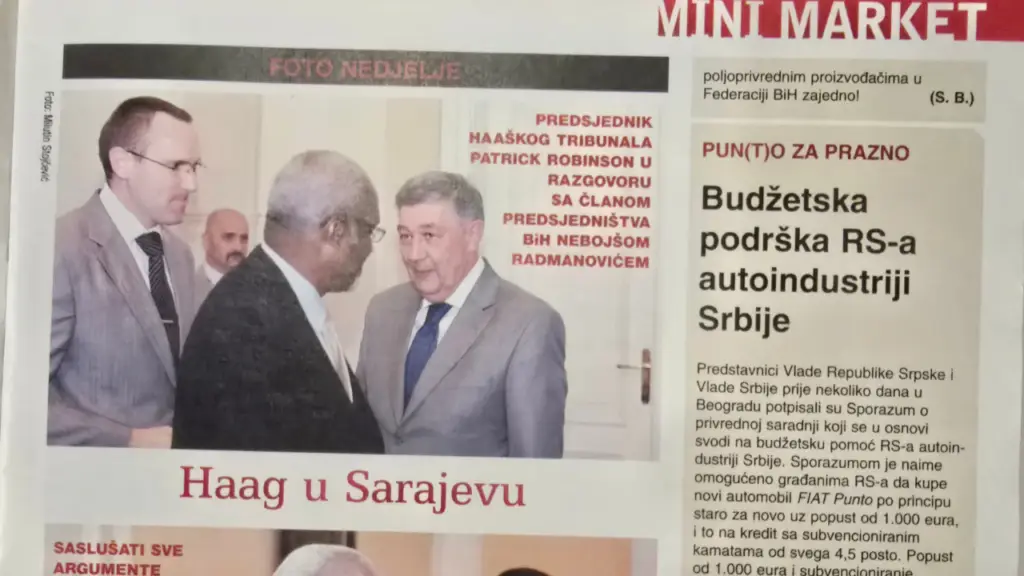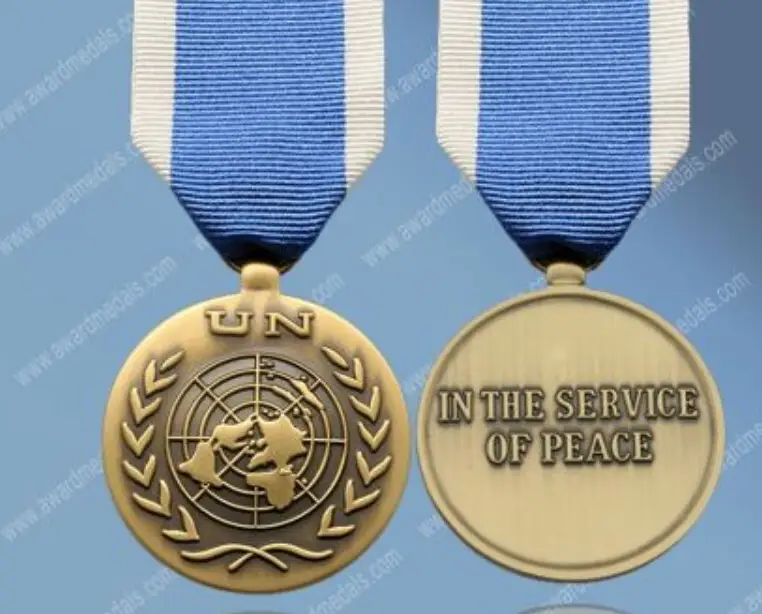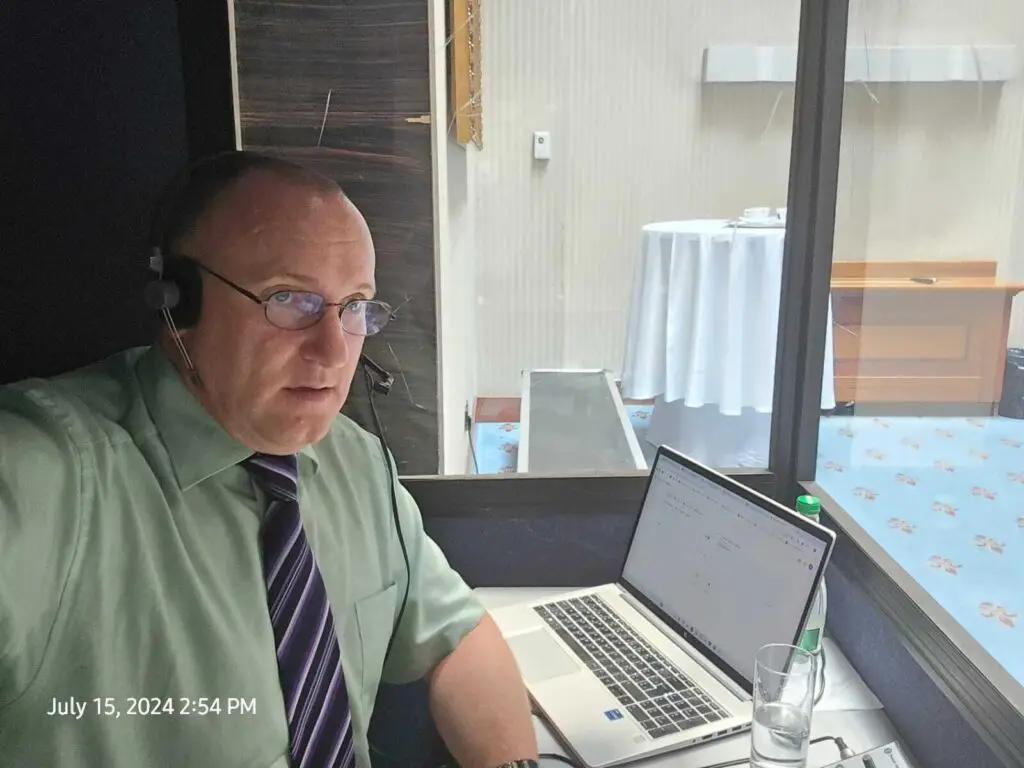Interpreter stories reveal the heart of our profession, fostering human connection during life’s pivotal moments. This December, Dieter Runge sat down with Darko Bartula, a Bosnian, Croatian, Serbian, and Montenegrin conference interpreter whose career began in the aftermath of the Bosnian War, a conflict that reshaped his life and his country.
At just 17, Darko’s dreams of becoming an electrical engineer were interrupted as the war created a pressing need for interpreters. By 22, he joined the United Nations, stepping into high-stakes environments that tested his character and interpreting skills.
Over nearly three decades, Darko has interpreted for diplomats, world leaders, and the United Nations International Criminal Tribunal, facilitating witness statements and preparing witnesses for courtroom testimonies in war crime trials. His work has taken him into dangerous territories, from home searches to navigating threats of retaliation and resisting bribes. And, despite having many reasons not to, Darko remained unbiased and professional in his work, allowing the Tribunal to fulfill its duty of justice.
An early adopter of remote interpreting, Darko has worked with Boostlingo to advance the technology since its inception. Yet, as AI and remote tools rise, he remains a passionate advocate for the immutable core of interpreting – cultural sensitivity, emotional intelligence, and ethical judgment.
Today, he invites the next generation of interpreters to embrace lifelong learning and adapt to an ever-changing world.
In this article, we’ll examine some of Darko’s most memorable assignments in an attempt to uncover what it takes to be the voice that bridges global leaders, war survivors, and the corridors of diplomacy.
United Nations International Criminal Tribunal
In 2003, after the UN mission in Bosnia ended, Darko transitioned to the United Nations International Criminal Tribunal for the former Yugoslavia (UNICTY), serving primarily as a consecutive interpreter for the prosecutor’s office.
The Tribunal’s mission to prosecute war crimes and deliver justice for victims often placed Darko and his colleagues in challenging and high-risk situations. In some cases, witnesses who provided critical information were tragically murdered after cooperating.
The risks extended beyond the offices of the UNICTY. Darko accompanied NATO soldiers during searches of war crime suspects’ homes. Among 100 soldiers present, only he and the Tribunal investigator were unmasked, heightening fears of retaliation after delivering court warrants to families.
One of the most harrowing moments of Darko’s career came during a widely publicized search of the home of the most wanted war crimes suspect during the Bosnian War. The next day, media coverage of the UNICTY President and a Member of the Bosnia and Herzegovina Presidency unintentionally revealed Darko’s identity to the public (pictured below). This exposure left him deeply apprehensive, fearing that the family whose home had been raided might retaliate.
Fortunately, despite these risks, neither Darko nor his UN colleagues faced repercussions for their work. Their commitment to the pursuit of justice while in danger is a testament to their courage and resilience in the face of immense pressure.

Article with Darko (left), the president of UNICTY, and a Bosnian Member of the Presidency.
Principles of a High-Stakes Interpreter
How does an interpreter maintain absolute neutrality when it clashes with personal experiences? Few have faced this question as intensely as Darko.
One of his most difficult moments came when interpreting for an individual whose wartime actions caused immense suffering in Sarajevo. This person had cut off the city’s water supply for two months, forcing residents to risk their lives for basic survival.
Darko recalled how people would dig wells and endure hours-long lines for water. His family faced this danger firsthand. During a shelling, his three-year-old sister suggested to their mother that they collect water, believing the risk was worth avoiding the line. Fortunately, they returned safely, but the memory of that peril never faded.
Interpreting for the person who caused such suffering was an emotional and ethical challenge. Yet, Darko relied on his principles to navigate these moments. By committing to impartiality he focused on facilitating unbiased communication without influencing outcomes. During emotionally charged sessions, he concentrated on accuracy, tone, and flow to distance himself from the content. Afterward, he processed these challenges with colleagues to make sure it wouldn’t affect his future work.
These ethical principles guided Darko in overcoming immense challenges while upholding the highest standards of his role. When his tenure with UNICTY ended in 2014, with the Tribunal’s downsizing, he left with recognition letters and a medal for 10 years of service.
Darko’s story is a powerful lesson in balancing professionalism, ethics, and courage, demonstrating the significant role interpreters play in ensuring justice under the most difficult circumstances.

UNICTY Certificate and Medal that Darko received for 10-year continuous service.
Interpreting for World Leaders
Working with high-profile individuals in legal and diplomatic contexts demands a unique skill set: navigating complex power dynamics and interpreting with precision in unpredictable conversations.
One of Darko’s most memorable experiences came while interpreting a discussion between the Queen’s Counsel Prosecutor, Sir Geoffrey Nice KC, and former Yugoslav President of the Presidency, Mr. Raif Dizdarević. Geoffrey was the lead prosecutor in the landmark case against Serbian President Slobodan Milošević, who later died in detention at the ICTY.
The conversation, conducted in highly diplomatic and aristocratic language, lasted several hours and required Darko to carefully interpret their eloquent exchanges.
During a lunch break, Mr. Dizdarević revealed his flawless English, asking Darko to take a break so they could speak directly.
Startled, Darko asked why he hadn’t corrected him or revealed his fluency earlier. Mr. Dizdarević revealed that he had been carefully planning his next points and didn’t want to interrupt the flow of the session.
Darko was amused and impressed by his demonstrated grace and patience. Moments like this illustrate how interpreters act as silent participants in significant conversations. By maintaining professionalism and precise accuracy, they foster understanding and respect among the world’s most influential figures.
Boostlingo’s First Bosnian Interpreter
Darko’s commitment to the field didn’t end with his work with world leaders. It extended to advancing interpreting technology with Boostlingo, where he began working in 2016 to provide Bosnian, Serbian, Croatian, and Montenegrin interpreting services.
Darko has been instrumental in shaping our platform’s remote interpreting technology and has used it daily since its inception, gaining new access to work through the project.
Remote interpreting has made interpreting more accessible, enabling interpreters like Darko to work across borders without the need for travel. However, this shift also introduces challenges, particularly in high-stakes environments like international law.
One major challenge is the loss of non-verbal cues. Remote interpreting, especially over the phone, limits access to body language, facial expressions, and subtle interactions – essential for accurately conveying tone and intent.
Another issue is technological barriers. Poor audio quality, unstable internet, and platform limitations can disrupt communication and hinder interpreters. Darko also notes that virtual settings can sometimes diminish the perception of impartiality, as physical presence in face-to-face settings often reinforces an interpreter’s impartial role.
Despite these challenges, Darko believes remote interpreting can maintain high standards when interpreters and clients receive proper training and preparation. Interpreters must adapt to remote platforms and develop skills to manage virtual dynamics effectively. Institutions, in turn, should invest in reliable platforms and high-quality audio and video equipment.
Looking ahead, Darko views technology, including AI interpreting, as a complement to human interpreters. While AI tools can speed up preparation and improve accuracy, they lack the cultural sensitivity, emotional intelligence, and ethical judgment that human interpreters bring to nuanced conversations.
Ultimately, though technology will continue to shape the field, the core of interpreting —accuracy, trust, and human connection—will always rely on skilled professionals. Interpreters who embrace technology while honing their human strengths will thrive in this evolving landscape.
Imparting Wisdom for New Interpreters
Darko’s advice to new interpreters is an invitation to envision the future. Interpreters who master professionalism and cultural and emotional intelligence will be prepared to navigate the world as global diplomacy becomes more complex.
Interpreters specializing in emerging fields like international environmental law, cybercrime, and global health will find increasing demand for their expertise.
Interpreters who embrace remote interpreting and integrate AI into their workflows will expand their capabilities and remain competitive in the evolving profession.
“We interpreters, we were always taught that we should know a little bit of everything… We can be perfect public affairs officers; we can be perfect communication experts. We can be perfect stewardesses, all sorts of things. So, there is always hope, potential, and a future for us interpreters because our foundation is great.”
Darko’s words remind us that interpreters are not just linguistic experts but conduits of understanding in an increasingly complex world. As the field evolves, adaptability, professionalism, and humanity will remain indispensable.
Watch the full BoostCast episode with Darko on high-stakes interpreting here.



